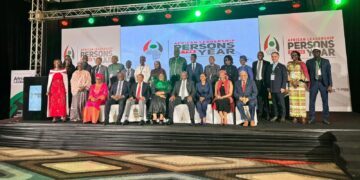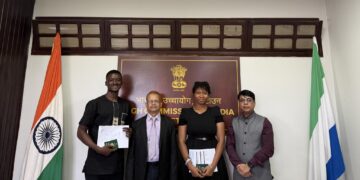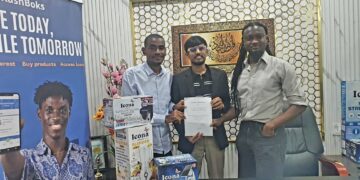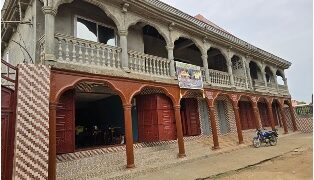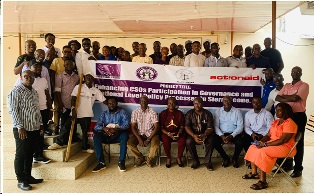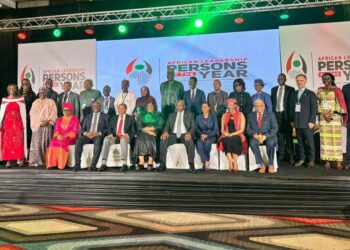In a landmark event, civil society organizations (CSOs) from Bo, Kono, and Bombali have convened in Makeni for a strategic cross-district policy dialogue under the European Union-funded project titled “Enhancing CSOs’ Participation in Governance and National Level Policy in Sierra Leone.” The event marks a significant phase of the ActionAid Sierra Leone–led initiative that seeks to deepen CSO involvement in policy development, advocacy, and accountability through evidence-based dialogue.
The dialogue builds on previous district-level policy forums held in the three participating districts. Its goal is to synthesize the issues raised locally and identify three key policy concerns to be presented at the forthcoming National People’s Conversations in Freetown, where Members of Parliament, ministers, development partners, and the EU will be engaged.
Alie Amara Conteh, a representative of Women’s Action for Human Dignity (WAHD) in Bombali, described the process as one that started weeks ago with district-level dialogues targeting local councils, media, and human rights organizations. These discussions were meant to bring out genuine concerns that communities face in governance and development.

“This is a process started some weeks back that entails district policy dialogues actively targeting the local councils and also CSOs in Bombali, including the district human rights network, committee, and the media,” Conteh explained.
He stressed that assumptions could no longer guide advocacy and that evidence must inform action. “We can’t assume that the prevalence of unfairness is very high in Makeni without evidence. This was a platform that was created to provide evidence and engage stakeholders and put forward our case—these are the problems happening within Bombali—then we proffer recommendations and see how we can advance our advocacy skills.”
Conteh emphasized that this cross-district gathering is a means of merging various district-level issues into a joint front. “This is not our bus stop because the issues are coming from Bo; they have theirs, and Kono as well, three respectively—and Bombali. We have come together in what we call the cross-district policy dialogue. This brings issues from all these three districts and puts them together, and at the end of the day, we are looking for three out of the nine.”
He further added that the final outcome will be shared in Freetown. “We will bring them to Freetown, which we call the National People’s Conversations, where we will have members of Parliament, ministers, the EU, and other donors know that these are the policy issues from all three districts and see how we can advance our advocacy around that.”
On expected outcomes, Conteh stressed the importance of targeted advocacy, particularly around climate change: “One of our expectations as colleagues CSOs working on governance issues is to see how best we mount advocacy campaigns. For instance, if we are talking about climate change, we need to engage the Environmental Protection Agency, the Ministry of Agriculture and the Forestry Division, the local council environment unit, and others to get mitigation actions to address these issues.”
He added that CSOs plan to disseminate their findings widely. “In our policy brief, which we will take to the media to help us popularize them, we will get both soft and hard copies to other CSOs so they will be able to look into them and see how they will be able to develop proposals around that.”
Conteh emphasized sustainability and the continuation of advocacy beyond the current project. “For my organization, one way of sustaining this project is to see how these policy briefs can be used to develop proposals and continue our advocacy. This project is achievable because we were able to secure this based on the success of a previous one, through ActionAid’s support.”
He concluded by highlighting one of the greatest achievements: “Today the council can boast of a cordial relationship with the CSOs—and that is due to these interventions.”
Abu Bakarr Daramy, Chief Administrator for the Kono District Council, also praised the initiative for empowering CSOs and strengthening governance structures. He emphasized that for CSOs to perform efficiently, they must be trained, included in the process, and given access to information.
“Policies are rules, principles, and guidelines that define and guide an institution. Therefore, for CSOs to perform effectively and efficiently, they have to get the background, be included in the process, and be trained and qualified, which includes having access to all the information,” Daramy stated.
He acknowledged that this program has created a clear roadmap for CSO participation. “This program today has defined that road for CSOs and given them the opportunity to help them participate in policies that started at the grassroots level, all the way up to the national level.”
He explained how the council benefits from the process: “Today this is a great opportunity for the council and CSOs. For us at the council, we must take into account our people’s thoughts and align them with broader national objectives.”
Daramy emphasized the relevance of participation and transparency: “There is nothing more worthwhile and timely than this because when you talk about policies, these are the issues that define the roles of engagement at every level. How can we implement government policies effectively without the background? How can CSOs monitor government policies without participating in the process?”
He reaffirmed his role as Chief Administrator: “For us to effectively perform our job at the lower level, I, being a CA of a council, must ensure transparency as stipulated in the Local Government Act. That means I have to go back and relay information on all of these issues and their outcomes. We want to see how best we empower the councillors to officially report to council so that the message can sink to the lowest level.”
Adama B. Sesay, Vice Chairperson of the Bombali District Human Rights Committee, described the project as one with tangible community impact, especially as it nears completion after three years.
“This is a very important project. ActionAid and WAHD have been in this project for three years, and we are approaching the end,” she said. “Last week all of us had our own areas of focus, and today all three districts are here to see how best we can select the most important issues or prioritize things that are affecting us.”
She highlighted environmental degradation and value addition as major concerns. “For instance, the environment doesn’t only affect Kono but also all the areas—especially during this rainy season. Value addition is another area, especially in mining and even our local products, for us to see how best they get the best value so that Sierra Leone can develop.”
Joseph Blackie, Chairperson of CSOs in Bo District and one of the project grantees, praised the dialogue as a transformative intervention.
“This is one of the best interventions CSOs are doing in Sierra Leone. Before this time, we were going into controversy with local governance structures and even the national structure,” he explained. “But with this EU project, we are using a non-adversarial approach to engage government structures to see how we can bring development to people in their respective areas.”
He stressed that the issues raised cut across all districts and resonate nationwide. “The three districts benefiting from this project are dealing with issues prevalent across the country and creating impact across the nation.”
Blackie drew attention to the need for value addition in resource management. “For instance, the one that has to do with value addition to our minerals. Every mineral in this country has great potential. For example, cacao—the pod is very cheap, but by the time it goes out of the country and they add some chemicals and bring it back, it becomes chocolate that we buy at a very expensive cost, nothing less than NLe 5.”
As the Makeni cross-district dialogue concludes, CSOs from Bo, Kono, and Bombali have reaffirmed their commitment to turning local voices into national policy change. The upcoming National People’s Conversations in Freetown is expected to amplify their calls for inclusive development, resource justice, environmental protection, and grassroots empowerment.


